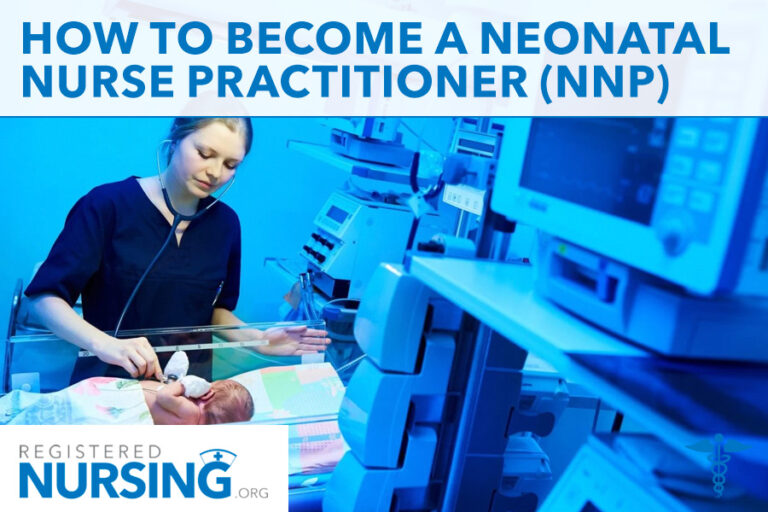Neonatal Nurse Practitioner (NNP)
- What is a Neonatal Nurse Practitioner (NNP)?
- Becoming a Neonatal Nurse Practitioner
- Step 1: NNP Education Requirements and Training
- Step 2: NNP Examination, Licensure, and Certification
- Step 3: Finding a Job and Career Outlook
- Neonatal Nurse Practitioner Salary & Employment
- Helpful Organizations, Societies, and Agencies

What is a Neonatal Nurse Practitioner (NNP)?
A neonatal nurse practitioner (NNP) is a highly skilled, highly educated advanced practice registered nurse (APRN) who is responsible for providing specialized care to newborn infants who are experiencing a broad range of acuity and states of health, including prematurity, low birth weight, infections, genetic disorders, congenital heart abnormalities, and respiratory problems. Neonatal nurse practitioners should also be well versed in the diagnoses of other health conditions. NNPs care for neonates who require constant attention and frequently act as primary caregivers to premature or ill newborn infants. Neonatal nurse practitioners can often be found working in intensive care units, delivery rooms, emergency rooms, and specialty clinics. In spite of the fact that neonatal nurse practitioners work under the instruction of a neonatologist physician or neonatal fellow, NNPs assume absolute responsibility for their patients' health, employing judgment when required to evaluate, consider, diagnose, and commence medical procedures.
Overview of NNP Careers
The educational and licensing requirements can vary, but in general, you can expect the following when becoming an NNP:
| Educational Aspect | Details |
|---|---|
| Education Requirements | Master of Science in Nursing (MSN) or Doctor of Nursing Practice (DNP) |
| Certification | Neonatal Nurse Practitioner Certification (NNP-BC), Neonatal Resuscitation Program (NRP) Certification |
| Licensing | Must hold a valid RN license and obtain certification. |
| Continuing Education | Required to maintain certification and stay current with medical advancements and best practices. |
| Work Aspect | Details |
|---|---|
| Role Description | An APRN specializing in the care of newborns, including those who are premature or critically ill, providing comprehensive care in neonatal settings. |
| Work Settings | Neonatal intensive care units (NICUs), hospitals, specialized pediatric centers, and some private practices. |
| Average Salary | $123,178 |
| Job Outlook | Expected to grow 38% from 2022 to 2032, driven by an aging population and increasing demand for healthcare services. |
| Key Responsibilities | Assessing and diagnosing newborns, developing treatment plans, managing acute and chronic conditions, providing family support, and collaborating with healthcare teams. |
| Skills Required | Advanced clinical skills in neonatology, critical thinking, decision-making, strong communication, empathy, and ability to handle high-pressure situations. |
Why Are Neonatal Nurse Practitioners So Important?
Neonatal nurse practitioners play a critical role in the care of newborns, particularly those born prematurely or with complex health issues. They possess specialized training to handle a range of neonatal conditions, from managing respiratory distress to overseeing intensive care interventions. Their expertise is vital in stabilizing and treating vulnerable infants, providing both immediate and long-term care to ensure healthy development.
Additionally, NNPs often serve as a bridge between families and the healthcare system, offering support, education, and advocacy to help parents navigate the challenges of having a critically ill or premature baby.
Becoming a Neonatal Nurse Practitioner
Prospective neonatal nurse practitioners who wish to care for newborn infants need to have exceptional dexterity, vision, agility, and should be highly observant with excellent hearing to ensure the well-being of infants under their care. Additionally, individuals seeking to become an NNP should exhibit a kind of empathetic understanding for not only their patients but their parents and family members as well. Prospective NNPs should be intensely interested in newborn babies and should have a solid understanding of both the physiological and psychological needs of the infant. Lastly, individuals interested in becoming a neonatal nurse practitioner should without a doubt possess both the competence to work in a highly technical field and the ability to work efficiently within a multidisciplinary team of medical clinicians.
Related: What's the Difference Between a Neonatal Nurse Practitioner and a Neonatologist?
Step 1: NNP Education Requirements and Training
Those interested in entering this distinguished and highly regarded medical career must first meet the entry-level educational requirements. Prospective NNPs must enroll in a four-year university to obtain their Bachelor’s of Science in Nursing (BSN) degree. After an individual has achieved their BSN, they can then sit for the NCLEX-RN (Nursing Council Licensure Examination). As soon as they have successfully passed the NCLEX-RN examination, the next step is to apply to the state's licensing agency to become a fully licensed, traditional registered nurse (RN). The final educational hurdle that a person seeking to become an NNP is to either earn a post-grad Master of Science in Nursing (MSN) degree with a concentration in neonatology, or to enroll in and complete a two-year Advanced Practice Neonatal Nursing (APNN) program. Completing one of these two educational programs is a prerequisite for licensure as a nurse practitioner (NP) or clinical nurse specialist (CNS). Both of these routes are acceptable for national certification and advanced practice licensure or recognition through all state Boards of Nursing.
Advanced practice university nursing programs typically will have their core curriculum in disciplines including neonatal physiology, embryology, advanced neonatal assessment, pharmacotherapeutics, and neonatal pharmacology. Graduate-level university programs are designed and formulated to meet all requirements for national certification. All graduate-level degree programs will consist of both didactic studies as well as clinical preceptorships.
Educational Prerequisites
Registered Nurse (RN) License: A valid RN license is typically required, often with a minimum of a few years of clinical experience in a neonatal or related setting.
Bachelor's Degree in Nursing: An accredited Bachelor of Science in Nursing (BSN) degree is usually required. Some programs might accept a Bachelor's in a related field if additional nursing coursework is completed.
Clinical Experience: Relevant clinical experience, especially in neonatal or pediatric care, is often required. This may be a specific number of hours or years.
GPA: A minimum undergraduate GPA is often required, typically around 3.0 on a 4.0 scale, though some programs may have higher requirements.
Letters of Recommendation: Letters from professionals who can speak to your clinical skills and potential as a graduate student.
Prerequisite Courses:
- Advanced Pathophysiology
- Advanced Pharmacology
- Advanced Health Assessment
- Pediatric Nursing
- Neonatal Nursing
- Statistics
- Ethics and Legal Issues in Nursing
Step 2: NNP Examination, Licensure, and Certification
After an individual completes their graduate or post-graduate education, they are then eligible for national certification through the National Certification Corporation, which recognizes NNPs. The majority of states require national certification for NNP licensure, although not all states recognize the same national specializations. It is important to check with your state's board of nursing beforehand to determine which NNP specializations are recognized.
The National Certification Corporation offers the following certifications for neonatal nurse practitioners:
To be eligible for the following low-risk neonatal nursing and maternal, newborn nursing certifications, individuals must meet the following requirements:
- Have a current RN license in the U.S. or Canada
- Have at least two years of experience in specialty experience
- Have been employed in the specialty area within the last two years
Core Certifications:
- Maternal Newborn Nursing
- Low-Risk Neonatal Nursing
- Inpatient Obstetric Nursing
- Neonatal Intensive Care Nursing
To be eligible for the neonatal nurse practitioner certification, individuals must meet the following requirements:
- Have a current RN license in the U.S. or Canada
- Have completed a formal nurse practitioner program which resulted in a master's, post-master's or doctorate in the specialty area
- Individuals need to have graduated from 2005 or later to be eligible for certification
Nurse Practitioner Certification:
To be eligible for the electronic fetal monitoring subspecialty certification exam, individuals must meet the following requirement:
- Hold a current license as an RN
- Hold a current license as a Nurse Practitioner
- Be a licensed M.D. (Medical Doctor)
- Be a licensed P.A. (Physician's Assistant)
To be eligible for the neonatal, pediatric transport subspecialty certification examination, individuals must meet the following requirements:
- Hold a current license as an RN
- Hold a current license as a Nurse Practitioner
- Be a licensed M.D. (Medical Doctor)
- Be a licensed P.A. (Physician's Assistant
- Be a licensed respiratory therapist or paramedic
Subspecialty Certifications:
Read more about neonatal nurse NP programs for further clarity on neonatal nurse certifications.
Step 3: Finding a Job and Career Outlook
Neonatal nurse practitioners can find employment in a variety of healthcare settings, and are most commonly employed in:
- Clinics
- Public & Private Hospitals
- Research Institutions
- Community-based settings
- Neonatal Intensive Care Units (NICUs)
- Medical Evacuation and Transport Services
- Home Health Services
Working Conditions
The job description of neonatal nurse practitioners includes a wide variety of tasks; however, their primary focus is on the highly specialized care of newborn infants. Neonatal nurse practitioner careers require the utmost diligence and high levels of teamwork. NNPs work in close collaboration with not only the parents and families of their patients, but also with neonatologists and other specialist clinicians to actualize the most favorable results for neonates. The highly specialized and in-depth training that NNPs must go through allows them to administer individualized assistance to infants from the moment they are delivered, whether they are born healthy or in critical condition. Furthermore, NNPs possess what is called ‘prescriptive authority' and are permitted (in most states) to prescribe medications as needed to their infant patients.
Neonatal Nurse Practitioner Responsibilities & Duties
Duties of neonatal nurse practitioners (NNPs) will depend on the distinct level of neonatal care an NNP is working in. However, some typical duties of NNPs include:
- Assessing vital signs
- Monitoring and appropriately managing specialized equipment like ventilators and incubators
- Drawing blood
- Beginning and maintaining IV lines in infants
- Providing education, assistance, and support to patients and their families concerning neonatal and postpartum care
- Properly distributing and administering medication in collaboration with a medical doctor
- Performing procedures like intubation and diagnostic tests
- Ensuring conventional feeding and basic car
The particular setting in which an NNP works will determine the kind of tasks they will be expected to perform. The following describes what kind of care each level entails and the kind of tasks NNPs are expected to execute:
Level | Description | Role of NNPs |
Level I NICUs | Basic Newborn Care: For newborns at 35 to 37 weeks' gestation who are physiologically sound. Stabilize preterm or sick infants until transfer. | Maintain stability of newborns, stabilize preterm or sick infants until transfer to higher-level care. |
Level II NICUs | Intermediate Neonatal Care: For newborns who are less critically ill but may need breathing/feeding support or specific medications. | Provide care for less critically ill newborns, support breathing/feeding, and administer medications as needed. |
Level III NICUs | Subspecialty Newborn Care: For infants born before 32 weeks' gestation or those with severe conditions. Offer access to subspecialties and advanced technologies. | Care for extremely premature or critically ill infants, provide access to subspecialties, respiratory support, and advanced imaging |
Level IV NICUs | Regional NICU; Highest Level of Neonatal Care: For infants as young as 22 to 24 weeks' gestation. Provide mechanical ventilation and advanced surgeries. | Provide advanced care including mechanical ventilation, high-frequency ventilation, and complex surgeries such as open-heart procedures. |
Neonatal Nurse Practitioner Salary & Employment
According to the U.S. Bureau of Labor Statistics, the nursing profession is predicted to increase by 32 percent by 2032. Recently, in the United States and Canada, there has been a vast shortage of nurses in specialized medical areas. According to the National Association of Neonatal Nurses and Salary.com, neonatal nurse practitioners (NNPs) receive an approximate median annual salary of $123,178, though this is dependent on experience, education, and geographical location. The leading states in NNP salary are:
- California
- Nevada
- Washington
- New Jersey
- Oregon
For job security, choosing a state with the highest employment rates of NNPs is also a good idea. These are:
- Florida
- California
- Texas
- New York
- Tennessee
As is the case with all careers in the nursing field, the need for neonatal nurse practitioners (NNPs) is anticipated to increase considerably in the coming decade. Typically, neonatal nurse practitioners with advanced education, training, credentials, and experience will be the most desirable candidates to potential employers.
Interested in learning more about NP salaries and other avenues of APRN careers?
Helpful Organizations, Societies, and Agencies
- The National Association of Neonatal Nurse Practitioners (NANNP)
- National Association of Neonatal Nurses
- Association of Women's Health, Obstetric, and Neonatal Nurses
- The Academy of Neonatal Nursing
- Journal of Obstetric, Gynecologic and Obstetric Nursing








